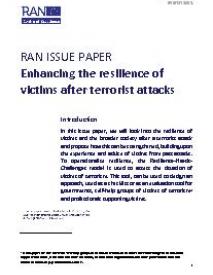[RAN ISSUE PAPER] : Enhancing the resilience of victims after terrorist attacks
Introduction
In this issue paper, we will look into the resilience of victims and the broader society after a terrorist attack and propose how this can be strengthened, building upon the experience and advice of victims from past attacks. To operationalise resilience, the Resilience-Needs-Challenges model is used to assess the situation of victims of terrorism. This tool, can be used to design an approach, used as a checklist or as an evaluation tool for governments, self-help groups of victims of terrorism and professionals supporting victims.
Before introducing this model, it is important to look at the variety of reactions displayed by victims and society alike after an attack has taken place, and to explore the key principles when it comes to psychosocial care. What are victims of terrorism going through? How should they be engaged? What is resilience in this situation?
Some victims are active in the field of countering or preventing terrorism and indeed, their voices can be extremely powerful. But this should not be expected from all. To carry out this work, resilience is a prerequisite, and the well-being of the victims of terrorism must be safeguarded.
Geachte bezoeker,
De informatie die u nu opvraagt, kan door psychotraumanet niet aan u worden getoond. Dit kan verschillende redenen hebben,
waarvan (bescherming van het) auteursrecht de meeste voorkomende is. Wanneer het mogelijk is om u door te verwijzen naar de bron
van deze informatie, dan ziet u hier onder een link naar die plek.
Als er geen link staat, kunt u contact opnemen met de bibliotheek,
die u verder op weg kan helpen.
Met vriendelijke groet,
Het psychotraumanet-team.
21 pages | [No location] : Ran Centre of Exellence
https://ec.europa.eu/home-affairs/sites/homeaffairs/files/what-we-do/networks/radicalisation_awareness_network/about-ran/ran-rvt/docs/enhancing_resilience_victims_after_terrorist_attacks_032018_en.pdf
RAN issue paper


